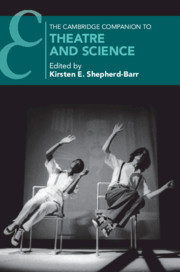Book contents
- The Cambridge Companion to Theatre and Science
- Cambridge Companions to Theatre and Performance
- The Cambridge Companion to Theatre and Science
- Copyright page
- Contents
- Illustrations
- Contributors
- Acknowledgements
- Introduction
- 1 Objectivity and Observation
- 2 Staging Consciousness
- 3 The Experimental/Experiential Stage
- 4 A Cave, a Skull, and a Little Piece of Grit
- 5 The Play at the End of the World
- 6 Bodies of Knowledge
- 7 Pathogenic Performativity
- 8 Theatres of Mental Health
- 9 Devised Theatre and the Performance of Science
- 10 Theatre and Science as Social Intervention
- 11 Acting and Science
- 12 Staging Cognition
- 13 Clouds and Meteors
- 14 ‘The Stage Hand’s Lament’
- Index
- References
3 - The Experimental/Experiential Stage
Extreme States of Being of and Knowing in the Theatre
Published online by Cambridge University Press: 20 January 2021
- The Cambridge Companion to Theatre and Science
- Cambridge Companions to Theatre and Performance
- The Cambridge Companion to Theatre and Science
- Copyright page
- Contents
- Illustrations
- Contributors
- Acknowledgements
- Introduction
- 1 Objectivity and Observation
- 2 Staging Consciousness
- 3 The Experimental/Experiential Stage
- 4 A Cave, a Skull, and a Little Piece of Grit
- 5 The Play at the End of the World
- 6 Bodies of Knowledge
- 7 Pathogenic Performativity
- 8 Theatres of Mental Health
- 9 Devised Theatre and the Performance of Science
- 10 Theatre and Science as Social Intervention
- 11 Acting and Science
- 12 Staging Cognition
- 13 Clouds and Meteors
- 14 ‘The Stage Hand’s Lament’
- Index
- References
Summary
Chapter 3: This chapter charts the intersections between theatre and science and explores how experience and experiment are interlinked in each domain. Looking at three key scientific ideas and theatrical moments, the chapter draws out contextual aspects of the science that reflect the scientific concerns of their moments. Exploring first a play from the early years of the recent resurgence in the interest in theatre and science, the chapter investigates how the biological and medical sciences with their obvious link to genetic testing and human experience are represented, and moves on to consider how science, gender, and life become crystal clear in early twenty-first century theatre. It concludes by looking at how theatre is shaped by the experience of climate change and its science in the 2010s through two very different plays, one a staged lecture and the other a production whose deliberate excess results in an expansive ‘epic’ theatrical form that appears to take precedence over the science.
Keywords
- Type
- Chapter
- Information
- The Cambridge Companion to Theatre and Science , pp. 40 - 54Publisher: Cambridge University PressPrint publication year: 2020



